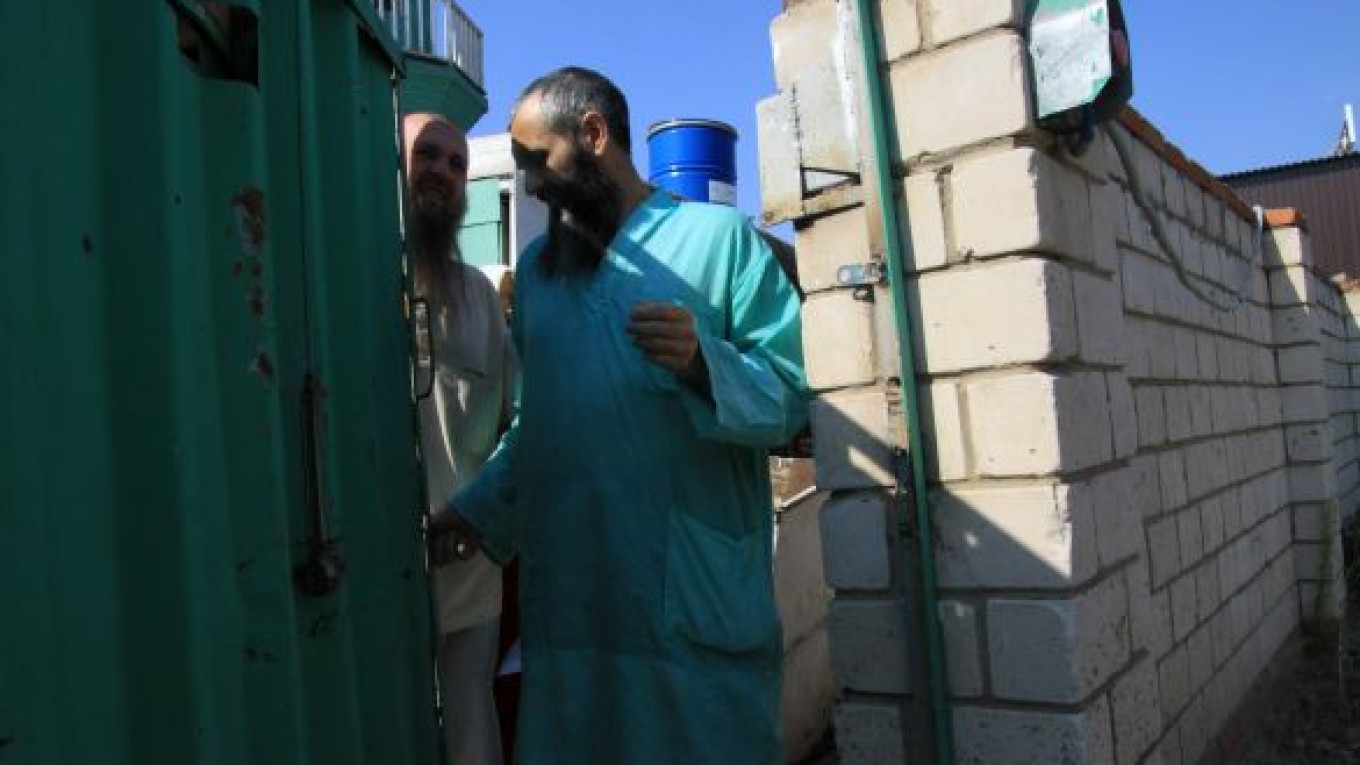A reclusive sect that literally went underground to stop contact with the outside world kept 27 children in dark and unheated cells, many of them for more than a decade, prosecutors said Wednesday. The children have been freed and the parents charged with child abuse.
Some of the children, aged between 1 and 17, had never seen daylight, health officials said. The sect's 83-year-old founder, Faizrakhman Satarov, who declared himself a Muslim prophet in contradiction with the principles of Islam, has also been charged with negligence, said Irina Petrova, deputy prosecutor in the provincial capital, Kazan.
No members of the sect, who call themselves "muammin" after the Arabic term that means "believers," have been arrested, she said.
The children were discovered last week when police searched the sect grounds as part of an investigation into the recent killing of a top Tatarstan Muslim cleric, an attack local officials blame on radical Islamist groups that have mushroomed in the oil-rich, Volga River province.
Satarov, a former top imam in the neighboring province of Bashkortostan, declared his house outside Kazan an independent Islamic state. He ordered some 70 followers to live in cells they dug under the three-story building topped by a small minaret with a tin crescent moon. Only a few sect members were allowed to leave the premises to work as traders at a local market, local media reported.
The children have been placed in local hospitals for observation and will temporarily live in an orphanage, pediatrician Tatyana Moroz said in televised remarks.
The cramped cells, without ventilation, heating or electricity, form eight levels under the decrepit three-story brick house on a 700-square-meter plot of land. The house was built illegally and will be demolished, Tatarstan police told local media.
"They will come with bulldozers and guns, but they can demolish this house over our dead bodies!" sect member Gumer Ganiyev said on the Vesti television channel. The ailing Satarov appointed Ganiyev as his deputy "prophet," according to local media reports.
Satarov has followers in several other cities in central Russia, local media reported.
In a 2008 interview with Komsomolskaya Pravda, Satarov said he fell out with other clerics and authorities in the Communist era, when the KGB allegedly sent him to Muslim nations with stories about religious freedom in the officially atheist Soviet Union. Government-approved Orthodox Christian and Muslim clerics routinely traveled abroad on Soviet publicity trips.
"That's how I became Satan's servant, a traitor," the white-bearded and turbaned man was quoted as saying. "When I understood that, I repented and started preaching."
Muslim leaders in Tatarstan said Satarov's views contradict their dogma.
"Islam postulates that there are no other prophets after Mohammad," Kazan-based theologian Rais Suleimanov told Gazeta.ru Tuesday. "The teachings of Satarov, who declared himself a prophet, have been rejected by traditional Muslims."
The sect members stopped accepting new members and are "only dangerous to themselves and their children," Suleimanov was quoted as saying.
Police entered Satarov's house last Friday as part of an ongoing investigation into the killing of Valiulla Yakupov, a former deputy chief mufti of the region, who was gunned down in mid-July as he left his house in Kazan. Minutes later, chief mufti Ildus Faizov was wounded in the leg after an explosive device ripped through his car in central Kazan.
Both clerics were known as critics of radical Islamist groups that advocate a strict and puritan version of Islam known as Salafism.
The emergence of Salafist groups in Tatarstan and other Volga River provinces with a sizable Muslim population has been fueled by the influx of jihadists and clerics from Chechnya and other provinces of Russia's Caucasus region, where Islamic insurgency has been raging for years.
A Message from The Moscow Times:
Dear readers,
We are facing unprecedented challenges. Russia's Prosecutor General's Office has designated The Moscow Times as an "undesirable" organization, criminalizing our work and putting our staff at risk of prosecution. This follows our earlier unjust labeling as a "foreign agent."
These actions are direct attempts to silence independent journalism in Russia. The authorities claim our work "discredits the decisions of the Russian leadership." We see things differently: we strive to provide accurate, unbiased reporting on Russia.
We, the journalists of The Moscow Times, refuse to be silenced. But to continue our work, we need your help.
Your support, no matter how small, makes a world of difference. If you can, please support us monthly starting from just $2. It's quick to set up, and every contribution makes a significant impact.
By supporting The Moscow Times, you're defending open, independent journalism in the face of repression. Thank you for standing with us.
Remind me later.


